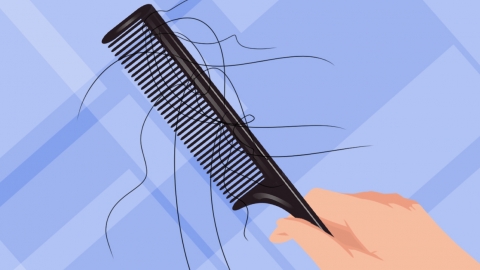How to manage hair loss caused by hypothyroidism
Hypothyroidism typically refers to hypothyroidism. Generally, hair loss caused by hypothyroidism may be due to insufficient thyroid hormones, impaired nutrient absorption, telogen effluvium, autoimmune damage, excessive mental stress, and other reasons. It is recommended to seek timely medical attention, identify the underlying cause, and improve the condition under a doctor's guidance through hormone supplementation, nutritional adjustments, medication, and other methods. Specific analyses are as follows:

1. Insufficient thyroid hormones: Hypothyroidism leads to reduced secretion of thyroid hormones, affecting the hair follicle growth cycle, causing thinning and hair loss. Follow your doctor's instructions to use medications such as levothyroxine sodium tablets, thyroid tablets, or levothyroxine sodium enteric-coated tablets to supplement hormones. Regularly retest thyroid function and adjust the dosage according to results to maintain stable hormone levels and promote hair growth.
2. Impaired nutrient absorption: Hypothyroidism affects gastrointestinal motility, leading to inadequate absorption of proteins, iron, and B vitamins, resulting in hair follicle malnutrition and hair loss. Adjust your diet to include more eggs, lean meats, spinach, and other foods rich in high-quality protein and iron. Take a daily B-complex vitamin supplement.
3. Telogen effluvium: Abnormal thyroid hormones cause more hairs to prematurely enter the telogen phase, leading to significant hair loss and thinning. On the basis of thyroid hormone supplementation, follow your doctor's advice to use medications such as minoxidil tincture, compound siyatandan hair growth tincture, or Yangxue Shengfa Capsules to promote the transition of hair follicles from the telogen to the anagen phase.
4. Autoimmune damage: Hypothyroidism is often accompanied by autoimmune issues, where the immune system may attack hair follicles, worsening hair loss, often accompanied by mild scalp itching. Patients should follow medical advice to use medications such as methylprednisolone tablets, prednisolone tablets, hydroxychloroquine tablets, and others to regulate the immune system.
5. Excessive mental stress: The distress caused by the disease can lead to prolonged mental tension, with sympathetic nerve activation affecting blood supply to hair follicles, worsening hair loss, accompanied by insomnia and anxiety. If anxiety is significant, medications such as oryzanol tablets, vitamin B1 tablets, and estazolam tablets may be used under medical guidance to alleviate symptoms.
In daily life, avoid staying up late and ensure 7-8 hours of sleep per day. Minimize hair pulling and avoid hairstyles that are too tight. Regularly monitor changes in hair loss volume and promote hair regrowth through comprehensive regulation and maintenance of scalp health.








